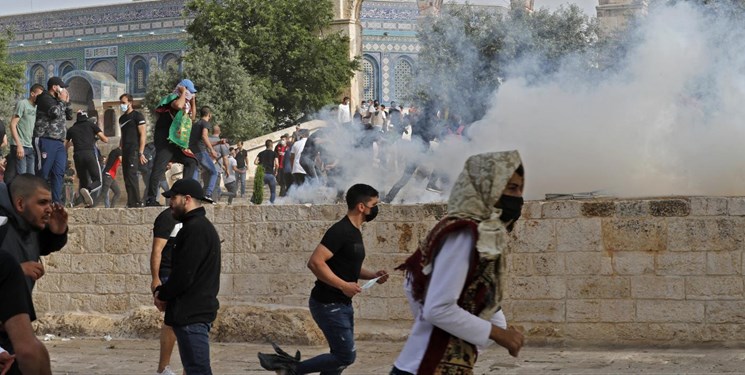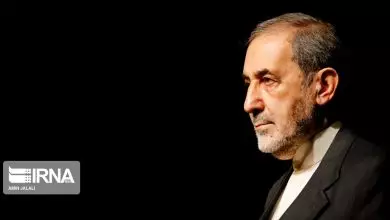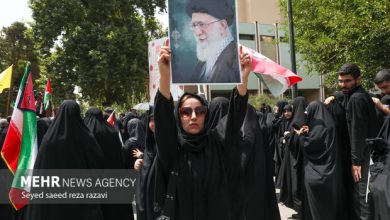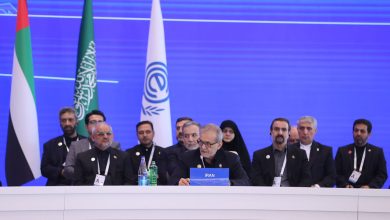Backed by Israeli Police, Jewish Settlers Storm Al-Aqsa Compound

Some 50 Jewish settlers, flanked by heavily armed Israeli special forces, stormed the Al-Aqsa Mosque compound in occupied East Jerusalem in the early morning, hours after Palestinian worshippers were beaten and assaulted by Israeli police, according to the Islamic authority overseeing the site.
Citing witnesses, Palestinian news agency WAFA said Israeli police had earlier on Sunday assaulted Palestinian worshippers who were performing dawn prayers at the mosque and “excessively beat” them in order to make way for Israeli Jewish settlers to storm the compound – Islam’s third-holiest site.
WAFA added that at least six Palestinians had been arrested, including Fadi Alyan, a guard at the Al-Aqsa Mosque who tried to film the incident, and Ali Wazouz, an employee of the Islamic Waqf Council, the religious body appointed by Jordan to oversee the Al-Aqsa compound.
Israeli police also increased restrictions at the gates leading to Al-Aqsa, barring worshippers under the age of 45 from entering the mosque.
The ancient marble-and-stone compound – known to Muslims as Al-Haram Al-Sharif – houses Al-Aqsa Mosque and the 7th-century Dome of the Rock.
The incident comes as a fragile ceasefire holds in the besieged Gaza Strip, days after the end of a brutal 11-day Israeli bombing campaign that killed at least 248 people, including 66 children.
An Israeli police crackdown on worshippers at the Al-Aqsa Mosque compound during Ramadan and the threat of forced expulsions of Palestinians from their homes in occupied East Jerusalem had ignited protests across the occupied Palestinian territories, which were cracked down by Israeli police as well.
Hamas, the group that controls the Gaza Strip, issued Israel a deadline to halt the crackdowns. The deadline passed unheeded, resulting in Hamas firing rockets towards Israel, and Israel launching an intensive bombing campaign on Gaza.
Hours after a truce took effect, Israeli police stormed the Al-Aqsa Mosque compound after Friday prayers.
In recent days, hardline Israeli settler groups have raised calls on social media for Jewish worshippers to enter the premises. The groups’ objective is to rebuild the Third Jewish Temple on the grounds of Al-Aqsa Mosque, according to their websites.
But under the status quo affirmed in 1967, only Muslims can pray within Al-Haram Al-Sharif.
Israeli Police Spokesman Micky Rosenfeld said the site was open for “regular visits” and that police had secured the area to prevent “incidents”, without elaborating, the Associated Press reported.
The Waqf said on Sunday it was the first time Israel allowed Jewish settlers to visit the site since May 4, a week before the latest conflict broke out.
In recent years, increasing numbers of religious and far-right Israelis have visited the Al-Aqsa Mosque compound.
Palestinians fear Israel plans to eventually take the compound over or partition it. The Israeli government has repeatedly said it has no intention of changing the status quo, under which the Waqf oversees the site.
Sunday’s incident was reminiscent of the confrontations in Jerusalem in early May. Israeli security forces had attacked sit-ins against the forced expulsion of Palestinians from their homes to make way for Jewish settlers in the occupied East Jerusalem neighbourhood of Sheikh Jarrah. They had also stormed Al-Aqsa, wounding hundreds of worshippers and arresting dozens of Palestinians.
The escalation sparked mob violence in Israel, and confrontations between Israeli forces and Palestinian protesters in the occupied West Bank.
Israeli forces have killed 25 Palestinians, including four under the age of 18, in the West Bank since May 10, authorities in the territory say. Israel claims five tried to attack Israeli forces.
Meanwhile, at least 14 Palestinians have been arrested from their homes in various cities in the occupied West Bank on Sunday.
Among them is 16-year-old Mohammad Hajeer from the Deir Ibzi village near Ramallah, and other youths from towns in the occupied West Bank cities of Jenin and Nablus.







